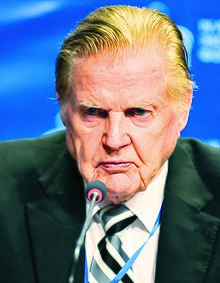
With our promotion of Dr Guy’s excellent biography, we get flak from time to time for saying that Gresham’s Law is best expressed as “good money drives out bad”.
Colloquially expressed as “bad money drives out good”, Gresham’s Law was attributed to Gresham in 1858 by Scottish economist Henry Dunning Macleod. In Tudor times, governments sometimes issued silver coins adulterated with lead, so that people traded in these coins while hoarding the more valuable pure silver coins, saving them up for better times, or exporting them out of the country to get their full value. Some folks reference Brittanica for example:
Gresham’s law, observation in economics that “bad money drives out good.” More exactly, if coins containing metal of different value have the same value as legal tender, the coins composed of the cheaper metal will be used for payment, while those made of more expensive metal will be hoarded or exported and thus tend to disappear from circulation. Sir Thomas Gresham, financial agent of Queen Elizabeth I, was not the first to recognize this monetary principle, but his elucidation of it in 1558 prompted the economist H.D. Macleod to suggest the term Gresham’s law in the 19th century.
Some points on Gresham’s law are: Gresham’s Law (a) goes back to Aristophanes, (b) is incorrectly expressed by most people, and (c) is falsely attributed to Sir Thomas.

The elegiac poet Theognis, writing in the late 6th and early 5th century BC, wrote a few lines suggesting Gresham’s Law – “Nor will anyone take in exchange worse when better is to be had.” Aristophanes expresses the Law in his 405 BC play, The Frogs. But these express more that “good money drives out bad”.
The best single piece on this, and quite a good read it is, is by the 1999 Nobel laureate, Professor Robert Mundell, “Uses and Abuses of Gresham’s Law in the History of Money”, Columbia University, August 1998 – https://www.mainelli.org/wp-content/uploads/2023/02/Uses_and_Abuses_of_Greshams_Law_in_the_History_of_Money.pdf.
“Cheap money drives out dear, if they exchange for the same price”, rather than the misleading and overly terse, “bad money drives out good”. More generally, “a cheap measure drives out a valuable measure, if they exchange for the same price”. His section, “Good Money Drives Out Bad”, states clearly:
The usual expression of the law, “bad money drives out good” is a mistake. Schumpeter refers to this common definition as “not quite correct.” But as the statement stands, it is not just “not quite correct;” it is quite false. The opposite is true!
Standing by itself, the general statement, “good money drives out bad,” is the more correct empirical proposition. Historically, it has been good, strong currencies that have driven out bad, weak currencies. Over the span of several millennia, strong currencies have dominated and driven out weak in international competition. The Persian daric, the Greek tetradrachma, the Macedonian stater, and the Roman denarius did not become dominant currencies of the ancient world because they were “bad” or “weak.” The florins, ducats and sequins of the Italian city-states did not become the “dollars of the Middle Ages” because they were bad coins; they were among the best coins ever made. The pound sterling in the 19th century and the dollar in the 20th century did not become the dominant currencies of their time because they were weak. Consistency, stability and high quality have been the attributes of great currencies that have won the competition for use as international money.
The same proposition holds with respect to the use of materials for international money. The precious metals won out over other substances not because they were “cheap” or “bad” but because they were more efficient than other instruments in fulfilling the required functions of money. Among the precious metals, gold drove out others not because gold was bad but because it was more efficient from the standpoint of effecting transactions at the least cost. The dollar became the dominant international money in a world of paper currencies not because it was “bad” but because, among the alternatives, it best satisfied the characteristics of an international money.
If Gresham’s Law could be rendered coherently as “bad money drives out good” it would have no claim to our attention as a serious proposition of economics. On the contrary, it is a completely false generalization, and an invalid rendering of Gresham’s Law.
George Selgin also has a good explanation – https://web.archive.org/web/20130317073119/http://eh.net/encyclopedia/article/selgin.gresham.law – pointing out how the expression gets pulled into the bimetallism debates of the 19th century, which gives some context for the use by Macleod below.
You might wish to skim the last major opus on Gresham before Dr Guy’s, “The Life and Times of Sir Thomas Gresham” (1839) – not exactly the world’s best written nor best researched history – by John William Burgon. I bought a copy of the two volume set when I became a Gresham professor, but it is nonetheless free online – http://books.google.co.uk/books/about/The_Life_and_Times_of_Sir_Thomas_Gresham.html?id=0uoJAAAAIAAJ&redir_esc=y. It makes an interesting Kindle read. There is no mention of “bad money” or “good money” or “Gresham’s Law”. Perhaps the closest Gresham himself comes to expressing his eponymous law is on page 484 in a letter to Queen Elizabeth – https://play.google.com/books/reader?id=0uoJAAAAIAAJ&printsec=frontcover&pg=GBS.PA484
Ytt may pleasse your majesty to understande, thatt the firste occasion off the fall of the exchainge didgrowe by the Kinges majes ty, your latte ffather, in abasinge his quoyne ffrome vi ounces fine too iii ounces fine. Wheruppon the exchainge fell ffrome xxvi*. viiirf. to xiii*. ivrf. which was the occasion thatt all your ffine goold was convayd ought of this your realme.
Henry Dunning Macleod (1821-1902) touches on Gresham in 1857:
At last, Sir Thomas Gresham explained to Queen Elizabeth that allowing base and degraded coin to circulate along with good coin caused it to disappear; that bad coin and good coin cannot circulate together; but that the bad coin invariably and necessarily drives out good coin from circulation, and alone remains current.
H. D. MacLeod, The History of Economics (London, 1896), pp. 38–9, quoting his 1857 essay on the topic.
This is close to Mundell. Again, in The History of Political Economy (London, 1858), available online here – https://play.google.com/books/reader?id=floBAAAAQAAJ&hl=en_GB&pg=GBS.PA475 – he goes further – https://play.google.com/books/reader?id=yqNCAAAAcAAJ&hl=en_GB&pg=GBS.PA477
Macleod starts the statement problem when he tries in 1860 to express things more completely in his “The Theory and Practice of Banking”, Volume 1, 1860, pages 218-219, where he appears to almost contradict his own expression in the same section, available online here – https://play.google.com/books/reader?id=jLRLAAAAYAAJ&hl=en_GB&pg=GBS.PA219 – (the three emboldenings are mine):
These considerations lead us to a fundamental and universal law in Political Economy, which has been found to be true in all countries and ages — That bad money drives out good money from circulation; or, as it is expressed in an anonymous pamphlet, A reply to the Defence of the Bank, setting forth the unreasonableness of their slow payments. London, 1696. “When two sorts of coin are current in the same nation of like value by denomination, but not intrinsically, that which has the least value will be current, and the other as much as possible will be hoarded,” or exported, we may add. The fact of the disappearance of good coin in the presence of bad, was noticed by Aristophanes ; and was long the puzzle of financiers and statesmen, who continued to issue good coin from the Mint, and were greatly perplexed by its immediate disappearance, till Sir Thomas Gresham explained the cause, whence we have called it Gresham’s Law of the Currency.
This law is of such fundamental importance in Political Economy, viz., That good and bad coin cannot circulate together, but the bad coin will drive out the good, that it may be interesting to quote the passage which contains the earliest notice, that we are aware of, of the phenomenon.” from circulation. Aristophanes, Frogs, 765, says: — “The State has very often appeared to us to be placed in the same position towards the good and noble citizens as it is with regard to the old currency and the new gold ; for we make no use at all, either at home or abroad, of those which are not adulterated, but the most beautiful of all money, as it would seem, which are alone well coined and ring properly, but of this base copper, struck only yesterday, and recently of a most villainous stamp. And such of the citizens as we know to be well-born and prudent and honorable gentlemen, and educated in the palaestra, and chorus, and liberal knowledge, we insult. But the impudent and foreigners, and the base born, and the rascals, and the sons of rascals, and those most recently come, we employ.” This law, thus first noticed by Aristophanes, has been found to be true in every age and country. It is also from the same principle that a paper currency is invariably found to expel a metallic currency of the same denomination from circulation. And to show the generality of the principle, it was found in America that when a depreciated paper currency had driven coin out of circulation, and a still more depreciated paper currency was issued, the more depreciated drove out the less appreciated from circulation.
The unattributed pamphlet Macleod mentions, “A Reply to the Defence of the Bank: setting forth the unreasonableness of their slow payments. … In a letter to his friend in the countrey. By a true Lover of his Countrey, etc.”, page 20, actually expresses the Law correctly as one notes above, before Macleod mashes it. It is also available online here (also search for ‘clipt’) – https://play.google.com/store/books/details?id=CPNmAAAAcAAJ&rdid=book-CPNmAAAAcAAJ&rdot=1
The pamphlet does not mention Gresham. Gresham would never have said baldly, “bad money drives out good”. Macleod provides a number of explanations in close proximity, any of which could be his “Gresham’s Law” – “bad money drives out good”, “when two sorts of coin are current in the same nation of like value by denomination, but not intrinsically, that which has the least value will be current, and the other as much as possible will be hoarded”, “disappearance of good coin in the presence of bad”, “good and bad coin cannot circulate together, but the bad coin will drive out the good”. The last, rather ambiguous one, seems to be the explanation driving the subsequent century and a half of schoolyard trivia. If only Macleod had said “good and bad coin cannot be forced to circulate together, but the bad coin will drive out the good”, we would have had a useful statement for everyday use.
I close this bit on Macleod with Mundell – “Schumpeter’s comment points up a paradox: the law is trivially easy to understand, but then why does everybody get it wrong?”
So this year, Z/Yen has struck a coin that pokes fun at Gresham’s Law reversibility by having one phrase on the obverse and the other on the reverse – http://www.mainelli.org/?p=1287. Perhaps the 500th anniversary of Sir Thomas Gresham’s birth will help return attention to this 2,500 year old Law, and reverse 160 years of recent confusion brought on by Macleod. Hopefully over time “good law drives out bad” as “good money drives out bad”.
And two 2019 events:
- Dr Guy’s Gresham Lecture, 13 June – http://www.gresham.ac.uk/lectures-and-events/thomas-gresham-1519-2019
- FS Club event at the Guildhall exhibition with Dr John Guy, 17 June – http://fsclub.co.uk/events-focus.cfm?id=575
By way of addenda, I reference Mundell in this lecture that touches on Gresham’s Measurement Corollary
Gresham College – “The Perverse & The Reverse: How Bad Measures Skew Markets” – London, England (17 October 2005) – easy to read transcript here – https://www.zyen.com/media/documents/Perverse_aUgyxUR.pdf6 which made its way into our book, “The Price of Fish” https://www.amazon.co.uk/Price-Fish-Approach-Economics-Decisions-ebook/dp/B01HPVH806?tag=zyenlimite-21 with the relevant section available online here – https://books.google.co.uk/books?id=NQ19DAAAQBAJ&dq=mainelli+%22gresham%27s+law%22&q=gresham%27s+law#v=snippet&q=gresham’s%20law&f=false
In advance of the coming biography, I wrote a piece for this blog, http://www.mainelli.org/?p=551, and a piece for the London Topographical Society, http://www.londontopsoc.org/newsletters/Newsletter%2079, reiterating the more accurate expression.

